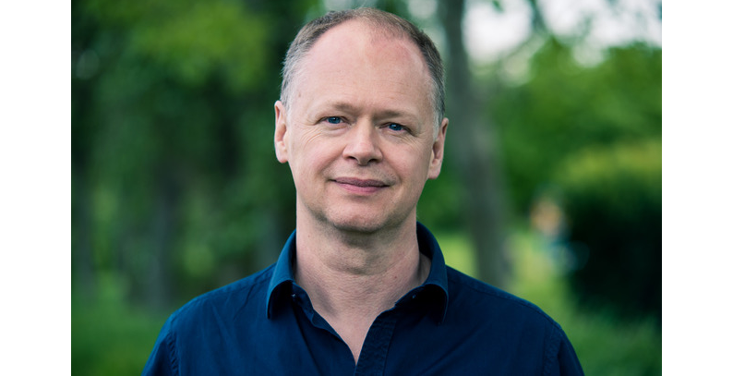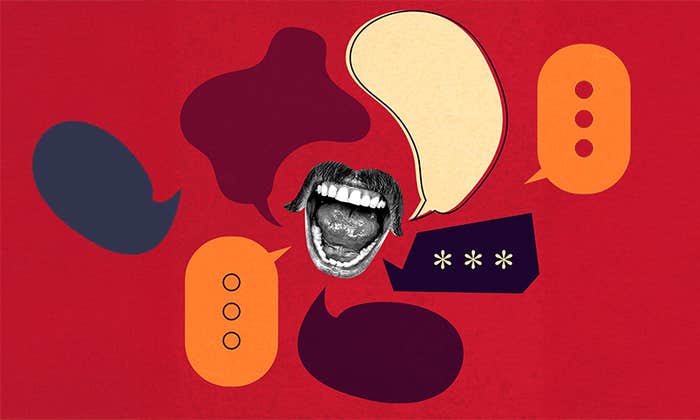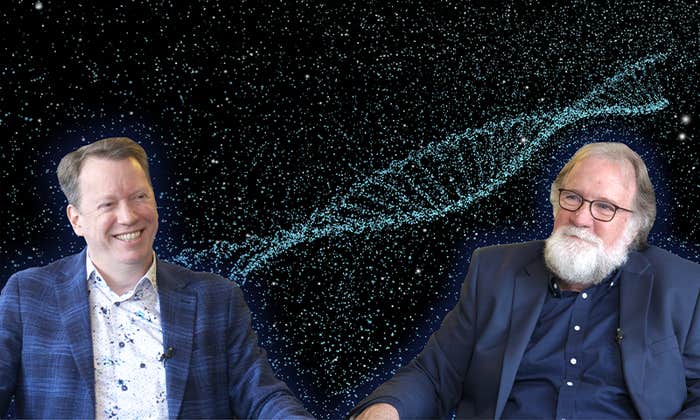A few years ago, David Adger was in his office at Queen Mary University of London, where he is a professor of linguistics, when the phone rang. It was a British TV company that wanted him to invent a language for monsters with no lips, just big teeth, in a new fantasy series, Beowulf. Adger loved the idea and concocted a wonderfully weird and complex language called Ur-Hag Hesh. Although he made it up for monsters, Adger says, “I used my knowledge of the linguistics of natural human languages as a blueprint.”
Adger’s knowledge of human languages runs deep. For decades he has ventured beyond the classroom to study languages in Kenya, India, the Himalayas, and the Scottish Highlands. In the linguistic world where a debate still sizzles over whether the world’s languages are generated by individual cultures or built on a similar foundation, Adger stands firmly on the latter side. Languages do not vary randomly, he says. “They have a design, a structure, a pattern, in common.” Despite that seeming constraint, Adger argues in his new book, Language Unlimited, that the sentences we make are infinite in faculty, form, and expression. Language “is the engine of imagination,” he writes. You can dive into the intellectual core of his thesis in the accompanying article, “This Simple Structure Unites All Human Languages,” in this week’s issue.
In conversation Adger is a generous explainer, self-deprecating and assertive, funny and passionate. I’ve read casually over the years about the controversy over Noam Chomsky’s “universal grammar,” and was anxious to get Adger’s take, which he offered with easygoing acumen. We talked about the brilliance of the film Arrival and how difficult it is to penetrate another person’s mind. I asked him to crystallize the argument of his new book for me, and he didn’t hesitate. “It’s an argument about our creative use of language,” he said. “We have a specialized kind of mental technology that neither animals nor computers have. That’s the capacity to combine individual bits of language, and then out of that build larger meanings.”

How does human language differ from animal language?
Animal communication tends to be one-to-one. You’ll have a call or a sequence of bird notes, and that call or sequence will link to one idea. “There’s a predator, run away.” “I want to have sex with you.” Without a doubt, there’s a link between the sound and meaning for animals. But humans can combine these into highly complex structures that carry new meanings. That doesn’t seem to happen with animals.
Now, apes and chimpanzees and bonobos are really bright. They’re amazing creatures. But bonobos don’t do syntax. If you look carefully at the way that they respond to us trying to teach them language, they’re using their general intelligence to figure out what they think we might want, or what we might be trying to say to them. Our language locks the meanings into place by the way that the things are combined together. We can’t make animals do this. It would be like trying to teach humans to do bee dances.
What’s the main thing you want to say about human language?
People have a notion of grammar as being a set of rules that someone tells you to do. “This is how you should speak.” I want to say, “No, look at the amazing complexity of languages around the world, and look at how unified it all is.” I wanted to take people’s minds away from this notion of grammar as something dry and boring, and something that people get told at school, and convey this fact that combining words into sentences is a wonder. It’s a marvelous aspect of our human universe. It takes us as finite beings and gives us almost infinite capacity to create new worlds of imagination.
There’s an interesting paradox in Language Unlimited. You write that language is endlessly creative but also our cognition is constrained by the structure of language. What does that paradox say about human beings?
You’re right. There is a wee paradox in there. That’s a nice thing to pick up on. I think about it like even numbers. There’s an unlimited number of even numbers but obviously they’re limited, right? Because 3s and 7s aren’t in there. Language is like that. There’s an unlimited number of possible things we can say, of sentence structures, but not anything can be a sentence structure. So you’re absolutely right. Language is unlimited, but it’s unlimited in a limited way.
The same things are specific in language after language after language. That suggests we don’t learn them.
What does that say about us as human beings? That’s a gigantic and fascinating question. It probably means our cognition is limited. There may be things that we can never solve because we don’t have the cognitive structures that will help to solve them. Imagine there were aliens. Other species would be able to think about and solve problems in ways that are outside our space of comprehension.
That was the brilliant idea at the heart of the film Arrival.
Yeah, that was one of the really interesting things about both the short story and the film. The aliens thought about things in a non-causal way. They looked at things from a whole perspective, they looked at a system as a whole. Whereas we humans tend to see things in terms of one thing causes the next. We use language as one of our major tools for thinking, and it may be that it just isn’t up to every task.
You write all human languages are unified by a simple principle. What’s that principle?
The really core human thing is the creation of hierarchical sentence structures called “Merge.” And what’s interesting about Merge is it doesn’t do much apart from create these hierarchies for you and link them to word orders and meanings. If you think about a sentence in a language, we don’t really think much about what we’re saying, they just come out, and hopefully convey what we mean. However, if you begin to look carefully at sentences, what you find is that they are organized in this hierarchy.
Let’s take a verb like run. In English we say, “The cat runs.” Run is the verb and the cat is the subject. And that occurs close to the verb. When you look at other languages, you can see that same piece of structure, the thing that conveys the same meaning, further away from the verb. In the Native American language, Kiowa, you see all these bits attached to the verb. You see something that tells you whether the action is completed or not. You see something else that tells you whether the individuals involved in the action are acting as a group or individually, and then there’s another thing on top of that, that tells you whether the whole thing definitely happened or just might have happened. You get this layering. But the verb is ultimately reflected in the rest of the hierarchy of the sentence. You find that same pattern—things that get attached to the verb—in language after language.
And what does that tell you?
That tells me there’s some underlying deep structure to how human language organizes sentences.
You mean an innate language structure in our brains?
I hesitate to use the word innate. Partly because everything’s innate. Clearly we’re not born as blank slates. We’re born with human brains, and human brains see the world in particular ways and not in other ways. We can’t hear things that dogs can hear, we can’t see things that bats can see. We’re differently constituted, so of course the human brain’s full of innate stuff. The interesting thing is that some of what’s innate is language-specific. And the same things are specific in language after language after language. That suggests we don’t learn them.
At the same time, not everything in our cognitive abilities appears in every language. A verb marking whether the speaker has good evidence or not-so-good evidence for the thing they’re talking about is called an evidential. Over and over again, languages mark for whether the speaker has evidence for what they’re seeing. And yet no language we have discovered does something like that for whether a situation is dangerous or not. Which is weird because you might imagine from an evolutionary perspective that would be pretty useful. And yet not a single language has a verb marking whether a situation is dangerous. That makes me think this is innate. Our general cognitive abilities have a subset of concepts. And some subsets are available to human languages and some are not. No one understands why. It’s a total mystery. But it speaks to this universality of the idea that, in a sense, there’s one human language.
Your ideas evoke probably the only controversy in the linguistics world that has spilled over to popular culture—the debate over “universal grammar.” Noam Chomsky’s argument for universal grammar is contested by linguist and writer Daniel Everett, whose studies of the Pirahã people in the Amazon have been profiled in the New Yorker and championed by the late Tom Wolfe in his book The Kingdom of Speech. What is universal grammar?
Universal grammar is just the thing, or the collection of things, that humans have and other animals don’t, which allow us to have language. That’s a very broad definition. There are particular theories of what might be in universal grammar. One theory is there’s nothing in it. It’s an empty concept. Other people say, “Universal grammar is rich. It contains a lot of language-specific stuff.” I’m at “it’s fairly empty but there’s still some stuff in there.”
Everett says there’s no such thing as universal grammar, that language is culturally generated, right? Actually, you better describe the debate, not me.
Dan and I have had many conversations about this online and in person, and I respect his work on the Pirahã, but we deeply disagree. Dan’s view that the main thing in universal grammar—following on a famous paper by Hauser, Chomsky, and Fitch—is something like Merge.
That’s “recursion,” right?
Right. But recursion is one of the most baffling words in linguistics because it’s used in about 400 different ways. The way Dan took it to be used is the following: A recursive system has something like a noun phrase inside a bigger noun phrase, or a sentence inside a bigger sentence. Basically you’ve got one type of grammar contained in a larger thing.
We use language as one of our major tools for thinking, and it may be that it just isn’t up to every task.
The way that Dan read the Hauser-Chomsky-Fitch paper is language is recursive. And it must be said that a lot of people have read it like this. It’s not just Dan. But Dan said, “Well, let me look at the Pirahã. I have an argument here that the Pirahã language does not have any of that. It just doesn’t have it.” And since this recursive thing from his perspective was meant to be something which is universal to all languages, then there’s a problem with the hypothesis. Because Pirahã, according to Dan, would falsify that hypothesis.
That’s one half of the controversy. The other half of the controversy is that people say, “Well, but that’s not what recursion is about.” There’s another notion of recursion, which is you can reuse stuff. That’s the notion I’m going for. Essentially, you’ve got a part of grammar and you can reuse it in building a larger structure. It doesn’t need to be a phrase within a phrase or sentence within a sentence. You just reuse a piece of structure. You build up these hierarchies of structures and they never end, in a sense. To do that, you need what’s called a recursive procedure—something that allows you to reuse and build things up in larger and larger ways. That’s a recursive device.
Does that mean Pirahã uses recursion, just by another name?
According to Dan, I think, Pirahã has a hierarchical structure. It’s just that he thinks the hierarchal structure is flat, and therefore Pirahã doesn’t make use of this massive recursive device. But it does. It builds up flat, small structures. As far as I understand, recent work on Pirahã shows that you have this ability to stack noun phrases at the start of the sentence to mark them as the topic of the conversation. So I think Pirahã just looks like another language. It has all of the normal properties that languages have. It just likes flat structures, apparently.
There’s another aspect of this that goes outside the technical things. If universal grammar is a capacity of the human species alone, then of course the Pirahã have universal grammar. Dan might say, “Yeah, but universal grammar is empty.” Still, if you stuck a Pirahã baby in a Portuguese-speaking family, presumably the baby would grow up speaking Portuguese. So what does it mean to say that that baby wouldn’t have universal grammar? Of course it would.
I think the universal-grammar controversy is interesting because it points to larger cultural wars about nature and nurture within science.
You’re right. And within linguistics, culture wars have been going on for a long time, partly because there are polarizing figures like Chomsky involved, and partly because of just, you know, academics being academics. One of the wars has been between people who are really interested in language as a social and cultural and communicative phenomenon, and people who are really interested in language as a structural, formal, biological, cognitive-psychological phenomenon. Broadly, the war is between the formal linguists and the sociolinguists. Actually, I think it’s a terrible war to have. But a lot of entrenched positions were drawn up in the ’70s and ’80s and they’re still there.
Personally I’ve been doing a lot of work on the relationship between syntax and sociolinguistics. We’ve got a big project right now, which is mapping all of the dialects in Scotland into a gigantic atlas and looking at how they all interrelate to each other and how people use them. I’m involved in another project looking at teenage speech in London and how that’s being affected by the multicultural society in which we live, and how that affects language and linguistics. We really should see language as part of a larger holistic picture, which pulls everything together, rather than as being at war with each other. I think that’s becoming truer and truer, especially the younger generation of linguists. They are much less part of the old culture war. They are more open to listening to each other and to thinking about language more holistically.
Your write that language, like fiction, creates meaning where none existed before. Have you ever thought that when we talk to each other, we’re just throwing fictional worlds at one another?
I totally think that’s what we’re doing! This goes back to what the limits of humans are. Our own internal worlds are what we represent and think about the external world. They’re probably all wrong to start with, and then we try and link those fictions with other people’s fictions. I think most of our interaction is an attempt to align the fictions that we build to be able to survive in the world. And this goes back to culture wars. People have different fictions of the world and sometimes they are pretty brutally out of alignment. Like now. And that’s quite terrifying, right?
So how do people understand each other?
Our languages allow us to both create these new ways of thinking and to maintain the ways of thinking we’ve already built. So there’s another paradox there, which is that language maintains as well as creates. But then our individual worlds can be distinct. And trying to pull them into cohesion with other people is a huge amount of work.
Kevin Berger is the editor of Nautilus.
Lead image: durantelallera / Shutterstock


























